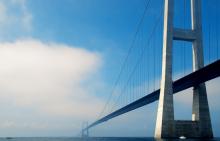bridge

SUMMER IS READNG time and there’s nothing I like more during the warm months than delving into geeky works on religion. This summer, Peter L. Berger and Brian D. McLaren have topped my list.
In a set of recent essays, Berger emphasizes that relativism and fundamentalism are two of the most prominent religious paths in the world today. Here’s my one line definition of fundamentalism: “Being me is based on dominating you.” And my simple definition of relativism: “I no longer know who I am when I encounter you.”
For Berger, while relativism and fundamentalism are at opposite extremes, they are actually closely connected in that they are both “products of the same proc-ess of modernization.” As he first wrote decades ago in his book The Heretical Imperative, frequent and intense encounters between people with different identities is the signature characteristic of the modern era. In Berger’s pithy phrase: modernity pluralizes.
Berger continues, “pluralism relativizes ... both institutionally and in the consciousness of individuals.” In the pre-modern era, institutions, ideas, and identities had a largely taken-for-granted status. For most of human history, the vast majority of humankind had little to no choice about which institutions they were going to participate in or what their identities were going to be. Such matters were experienced as fate.
If we seek to follow Jesus in context, nothing is more contextual than a watershed.

SINCE THE 2014 election could be the most decisive political moment in a generation, the most important question is: Who will be Hillary's running mate in 2016?
The second big question is: What else does Chris Christie have to do to make other Republican presidential hopefuls slip back into the woodwork? What part of “you want a piece of me?” don’t they understand? Have they no fear of—just to choose something at random—major traffic delays in their districts? Are they currently enjoying their drinking water or other public utilities? Do they like their kneecaps?
A bit harsh, perhaps, especially regarding a man whose political obituary is already being written, and whose Wikipedia entry may one day not start with “45th president of the United States,” but with the phrase “Angry Birds spokesperson.”
But Chris Christie is a survivor. He may be only six Twinkies away from not being governor of New Jersey (assuming that he eats them all in one sitting), but he enjoys a strong approval rating and, at this writing, is still innocent of all accusations against him, including humility. His only real threats for the nomination are Paul Ryan and Jeb Bush, who is currently trying to be adopted by a family with a different last name.
The influence scandal that has roiled Christie’s staff and highlighted his strong negatives happened, after all, in New Jersey. And what happens in New Jersey stays in New Jersey because, for their own protection, witnesses tend to fugetaboutit.
Carol Roth offers support, resources, and ministry to Native Mennonites and their conferences.

Energy policy and climate change action are inexorably linked, like two oxen in a yoke.
The trouble with this set-up is that while climate action tends to look straight ahead, energy policy is apt to veer off on any number of paths, some of them quite well-meaning, like job growth or “energy independence.”
Last night’s State of the Union address by President Obama was, I’m afraid, one such experience for climate action, which compared to the huge bull of energy issues is a yearling at best. The yoke between energy and climate did get mentioned by the president, but the yoke pressed toward economic growth, the paradigm which many argue is responsible for our ecological crisis in the first place. It’s enough to strain a vertebra.